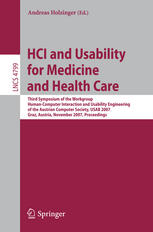

Most ebook files are in PDF format, so you can easily read them using various software such as Foxit Reader or directly on the Google Chrome browser.
Some ebook files are released by publishers in other formats such as .awz, .mobi, .epub, .fb2, etc. You may need to install specific software to read these formats on mobile/PC, such as Calibre.
Please read the tutorial at this link: https://ebookbell.com/faq
We offer FREE conversion to the popular formats you request; however, this may take some time. Therefore, right after payment, please email us, and we will try to provide the service as quickly as possible.
For some exceptional file formats or broken links (if any), please refrain from opening any disputes. Instead, email us first, and we will try to assist within a maximum of 6 hours.
EbookBell Team

0.0
0 reviewsThe work group Human–Computer Interaction & Usability Engineering (HCI&UE) of the Austrian Computer Society (OCG) serves as a platform for interdisciplinary exchange, research and development. While human–computer interaction brings together psychologists and computer scientists, usability engineering is a discipline within software engineering. It is essential that psychology research must be incorporated into software engineering at a systemic level. The aspect of integration of human factors into informatics is especially important, since it is here that innovations take place, systems are built and applications are implemented. Our 2007 topic was “Human–Computer Interaction for Medicine and Health Care” (HCI4MED), culminating in the third annual Usability Symposium USAB 2007 on November 22, 2007 in Graz, Austria (http://www.meduni-graz.at/imi/usab-symposium). Medical information systems are already extremely sophisticated and technological performance increases exponentially. However, human cognitive evolution does not advance at the same speed. Consequently, the focus on interaction and communication between humans and computers is of increasing importance in medicine and health care. The daily actions of medical professionals must be the central concern, surrounding and supporting them with new and emerging technologies. Information systems are a central component of modern knowledge-based medicine and health services, therefore knowledge management needs to continually be adapted to the needs and demands of medical professionals within this environment of steadily increasing high-tech medicine. information processing, in particular its potential effectiveness in modern health services and the optimization of processes and operational sequences, is of increasing interest.